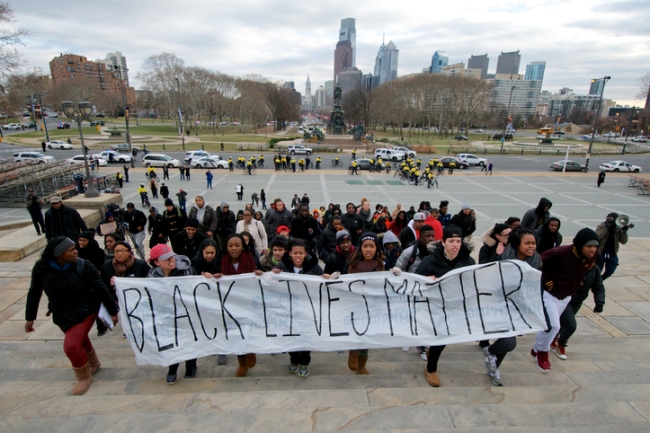You have /5 articles left.
Sign up for a free account or log in.

Temple University students march in Philadelphia in 2014
iStock.com/Bastiaan Slabbers
Colleges are announcing new curriculum and resources to improve the experience of Black students on campus and help dismantle structural racism in higher ed. Institutional leaders are also following through on promises made last month to help promote racial equity in the wake of the murder of George Floyd and nationwide protests about racial injustice.
Beyond the symbolic and long-demanded removal of statues and names of historical figures with ties to the Confederacy and racist ideologies, colleges are also developing new antiracism courses and requiring all students to take courses on diversity, equity and inclusion. Some colleges are exploring ways to better financially support Black students, to alleviate the vestiges of discriminatory Jim Crow-era policies and, more recently, the coronavirus pandemic. which has disproportionately impacted the health and income of people of color.
Ivory Toldson, a professor of counseling psychology at Howard University, a historically Black university in Washington, D.C., said he has encouraged efforts to close Black students’ income disparities while on recent calls with leaders at Louisiana State University, his alma mater. Toldson said he was among the first generation of Black students to attend LSU during the 1990s without race-based restrictions. He believes institutions that participated in segregationist policies should atone for “all the economic opportunities that were closed to Black people for so long.”
“This is the beginning of the conversations,” Toldson said. “It’s a lot easier to make symbolic gestures, but if you really want to make change, you have to invest money to make that happen.”
An ongoing fundraising campaign at Cornell University is focused on combating growing economic hardships among students due to the coronavirus pandemic, which is hitting Black and Latinx communities harder than others, according to data from the Centers for Disease Control and Prevention. As part of the campaign, Robert Jain, a College of Arts and Sciences alumnus, donated $1 million for a scholarship fund specifically for Black students, students of color and those from other underrepresented groups who need financial assistance to continue attending Cornell, said Ray Jayawardhana, dean of the college.
The scholarship fund demonstrates that donors are taking note of both the racial disparities created by the pandemic and those that existed long before it. Awareness of the disparities are now being amplified by the current movement to end injustices against Black people, Jayawardhana said.
“What’s interesting is given the heightened attention in the country around diversity and equity, we are seeing donors step up to recognize and support the need,” Jayawardhana said. “I do think that the heightened recognition of racial disparities both in terms of the pandemic’s impact, and more broadly in the country, were motivating factors for the donors.”
Rice University in Houston was praised by student leaders last monthfor sharing a list of action items in response to Floyd’s murder that are intended to improve the experience of students of color on campus and contribute “to solutions more broadly,” a June 16 message from President David Leebron and Provost Reginald DesRoches said. New initiatives at Rice will include a fund to support student advocacy for racial equity in Houston’s criminal justice, voting, education and health-care systems; a fund for race and antiracism research; and two new hires -- a scholar in residence for racial justice and a vice provost for diversity, equity and inclusion, the message said.
Another Texas institution, Sam Houston State University, plans to launch a new 18-credit-hour minor in criminal justice equity and inclusion this fall and to hire a tenure-track race and justice scholar who will work in the Department of Criminal Justice and Criminology, said William Wells, the department chair. He said while the department has long had a required course for undergraduate criminal justice majors that focuses on disparities in the criminal justice system, the minor will bring in students majoring in other disciplines. The timing of the new minor is “right for our students and criminal justice professionals in the state,” Wells said.
“This is an important issue for the social sciences in general -- economics, sociology, political science and criminal justice,” he said. “To move our understanding forward of the broad-based issues of social justice, biases and inequalities, we need social scientists from across the disciplines working on this.”
Wells said he expects the increased focus on disparities in policing, prosecution and the prison system at SHSU to have an impact on the criminal justice system in Texas at large. The university, which is part of the state university system of Texas, educates one-quarter of all employees in the state’s criminal justice system, according to data from the Texas Higher Education Coordinating Board. The expanded curriculum will “send students out into the field,” especially those who are not majoring in criminal justice, with a better understanding of issues prevalent in the criminal justice system such as discrimination in police stops and searches, bail reform, and patterns in criminal sentencing, Wells said.
“It will force students to think about these issues in a much more critical way, a much more informed way,” Wells said. “We have a lot of cutting-edge, recognized police leaders in this state. This kind of emphasis now is going to pay dividends for years down the road.”
Sacred Heart University, a Catholic institution in Fairfield, Conn., is also helping students confront racial injustice. It recently led a multiday web series about white privilege in American institutions and how racism is antithetical to Catholicism. In a similar vein, Carthage College, a Lutheran institution in Kenosha, Wis., released a detailed plan to combat racism and discrepancies in retention and graduation rates among students of color on its own campus, acknowledging in a release that "while none of us has lived in a society without racism, we go forward in faith and conviction that such a society is possible and commit ourselves to realize it."
The University of Montana in Missoula, Mont., is scheduled to launch two summer courses focused on racial equity and criminal justice on July 27, including Dismantling Racism: From Theory to Practice. The course will expose students to "research-based and field-tested terms, concepts, and principles" that can be used to eradicate institutional racism, according to a course description.
Several colleges, including Rice, are also launching required courses or orientation programs for incoming and first-year students that cover diversity and inclusion. Such courses are frequently demanded by student activists who protest racist incidents and cultures at predominantly white institutions and are sometimes viewed as a superficial and ineffective way for colleges to claim they are addressing biases among students before a racial crisis occurs or in response them. But these courses are only as effective as their content and the faculty members who teach them, said Kmt Shockley, a professor of educational leadership and policy studies at Howard and a co-editor along with Toldson of a new book, Campus Uprisings: How Student Activists and Collegiate Leaders Resist Racism and Create Hope (Teachers College Press).
Shockley argues that if institutions truly want to transform the culture of their student body, required diversity and inclusion courses should provide students with a better understanding of the Black community, rather than focusing solely on racial divisions and inequities. Oftentimes the faculty members hired or selected to teach courses on these topics don’t have the knowledge base to go beyond discussions of slavery and discrimination and the successes and history of the Black community, he said. Students should ideally be “walking out of that room educated, instead of trying hard to see everyone as an equal,” he said.
“We know all of this is going on, but really do you know anything about the people that are involved in this conversation?” Shockley said of the students who take these required courses. “Have you learned anything about these people that may make you feel less biased against them? That I believe, is no … Higher education institutions don’t seem to be dedicated to building that kind of knowledge.”
Toldson said at minimum, the issues on campuses themselves that diminish Black students’ experiences are beginning to be recognized and discussed by college leaders before student-led protests and unrest force a conversation. He believes administrators are realizing that they could save resources by preventing conflict at their institutions, which in this moment of widespread demands for racial justice is a looming possibility, Toldson said.
“The injustices beyond the campus will heighten awareness and sensitivity to injustices on the campus,” he said. “Students will have their own ideas about things that are troubling them about their campus environment … [Administrators] get the sense that there’s a lot of dissatisfaction, and they want to do something about it.”




